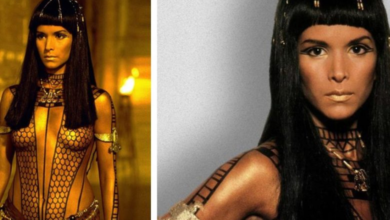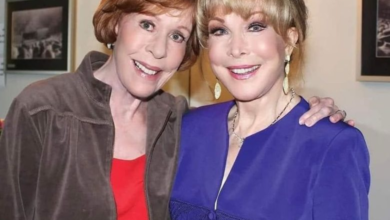A hungry girl offered to play the piano for food, and what followed moved everyone to tears.

The ballroom glittered beneath cascades of crystal chandeliers, their light dancing across polished marble and satin gowns. Soft laughter mingled with the swell of a string quartet. It was the annual “Voices of Tomorrow” gala — a night built on glamour, generosity, and quiet competition. Waiters glided between tables dressed in gold linens, carrying champagne flutes and trays of caviar, while guests murmured about art, influence, and success.
Outside, winter’s chill cut through the city. On the steps stood a barefoot girl in a faded gray dress, arms wrapped tightly around herself. Her name was Lydia. Hunger pressed in her stomach, but her gaze wasn’t on the food or the glittering guests — it was fixed on the black Steinway grand piano gleaming under the lights inside.
Not long ago, Lydia’s world had revolved around music. She used to fill their small apartment with sound, playing an old upright piano her mother had saved months to buy. Then came illness, then debt, then eviction. Her mother was gone now, and Lydia drifted through shelters and stations, surviving on scraps. But seeing that piano stirred something fierce within her — a spark she thought she’d lost.
She wanted to play again.
Drawing a shaky breath, Lydia stepped through the grand doors. Warmth met her immediately, along with a hush that rippled through the room. Heads turned. A security guard started forward, but Lydia spoke first.
“Please,” she said softly. “Let me play. One song — for a meal.”
Whispers rippled through the crowd. Some smiled politely; others frowned. The guard looked uncertainly toward the head table, where Oliver Marchand, the celebrated pianist and guest of honor, sat watching. His sharp gaze softened as he studied the girl — her trembling hands, her dirt-streaked dress, and the unmistakable light in her eyes.
“Let her play,” he said.
The guests parted. Lydia walked toward the piano, every step echoing in the vast silence. She sat, her fingers hovering above the keys. For a heartbeat, she hesitated — then pressed down a single note.
The sound was fragile at first, almost breaking. Then it grew — hesitant, then soaring. The melody was raw and uneven but alive. Each note carried her story: loss, cold nights, and faint memories of home. Yet within the sorrow was something bright — a pulse of hope that refused to die.
The chatter stilled. Champagne glasses were set down. Even the servers paused mid-step. The music filled every corner of the ballroom, dissolving the distance between wealth and want.
When the final note faded, the silence lingered like a held breath. Then someone began to clap — slow, reverent. Another joined. Soon, the entire room roared with applause.
Lydia sat motionless, tears catching the light.
She had asked for a meal but had given them something far greater.
Oliver approached, smiling gently. “What’s your name?”
“Lydia.”
“Well, Lydia,” he said, “you won’t need to play for food again.”
A plate was brought to her — not out of pity, but respect. Then Oliver turned to the crowd. “What we witnessed tonight wasn’t performance. It was truth. Music doesn’t come from comfort — it’s born from the soul. Lydia reminded us of that.”
Applause rose again. Some guests stood. Others wiped their eyes. Lydia barely heard them. For the first time in years, she felt seen.
That night, she ate her first real meal in weeks. But the warmth she felt came from more than food.
Afterward, Oliver slipped her a folded napkin with an address. “Come tomorrow,” he said. “It’s my conservatory. We’ll arrange lessons, a room, and a future — if you want it.”
“Why?” she whispered.
He smiled. “Because once, I played in the streets for coins. Someone helped me. It’s time I do the same.”
Lydia lay awake in the shelter that night, tracing invisible keys in the air. When dawn came, she walked to the address — The Marchand Academy of Music.
Inside, a woman greeted her with a smile. “We’ve been expecting you. Your piano is ready.”
Months passed. Lydia practiced endlessly. Her fingers, once stiff from cold, grew steady and strong. Her playing deepened — not from technique alone, but from the life that had shaped her.
Oliver visited often. “Never lose that,” he said once. “The heart in your music — that’s what makes it yours.”
Years later, Lydia’s name graced concert programs across the world. Audiences filled halls to hear the girl who had once played for bread.
One evening, she returned to the same ballroom. The chandeliers shimmered just as before, but this time, she stood beneath them in a simple blue gown. When she sat at the piano, her hands didn’t tremble. She played the same piece — fuller now, confident and whole.
When the applause thundered through the hall, Oliver, older and smiling from his seat, felt pride swell in his chest.
Afterward, a young boy approached, clutching a tattered envelope. “Miss Lydia,” he said shyly. “I don’t have much… but could you teach me someday?”
She knelt to meet his eyes. “You don’t need much,” she said gently. “Just a song inside you.”
As she walked home beneath the cold November sky, Lydia thought of the barefoot girl who had once played for food — and realized her hunger had never been for bread.
It had always been for music, for hope, for a voice.
And at last, she had found it.



